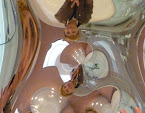
I read Julia Leigh’s second book Disquiet when it was first published in April this year. It was, to use the colloquial lingo of my times, ‘un-put-down-able’, meaning not that it was beyond criticism (the ‘putdown’, and the book has received some of those) but that I found it so compelling that I read it from start to finish in one sitting.
In short, I think this small book restores dignity to Australian fiction (not that Julia Leigh would like that responsibility or, in writing the book, sought that kind of burden). It’s just that the sprawling domestic, possibly faux-historic, and usually confessional, narrative ‘fiction’ that is churned out here is really just an opiate that seems to disregard the intelligence or intellect of readers and book buyers. Prose writers like Beverley Farmer, Martin Edmond, John Hughes and Gerald Murnane provide an alternative to the general mediocrity and muck and write from an interest not only in content but in what Julia Leigh calls 'the fall of the word on the page'.
I was given so much pleasure, and pleasure of thought, by the brilliant artifice, exact contrivance, self-consciously mannered and incredible wit-filled style in Julia Leigh’s Disquiet that, like some of the figures in the book, I was stunned into a kind of speechless reverie. It's a strange tale of the return of an Australian woman and her two children to her home and family in a French chateau, and it seems to have sent reviewers scurrying after a category. Some settled for 'Gothic' - I don't think so. I see the book as sliding through various 'categories' like German Romanticism,French nouveau roman (Michel Butor, shades of Nathalie Sarraute) and mystery.
This week I found a review that acknowledges Julia Leigh's writing's highly developed literary qualities in Kirsty Gunn’s intelligent piece in ‘The Guardian Weekly’. There is another positive review by Nicholas Birns in the May issue of the 'Australian Book Review' but, alas, it's not available online.
The reviewer in Melbourne’s daily newspaper, The Age, isn’t quite as disappointed in her assessment of this small knot of a book as her more conventional and perplexed counterpart in the 'Sydney Morning Herald' who seems unaware of any precursor or genre that relates to this intensely considered novella, other than the usual story-telling style of narrative that fills the shelves and piles up on coffee tables of the 'general readers' of Australian novels. The review seems to have been written without any notion of a context for this extraordinary book.
You can listen to a podcast/streaming of a brief interview with Julia Leigh, broadcast today on ABC Radio National.

No comments:
Post a Comment